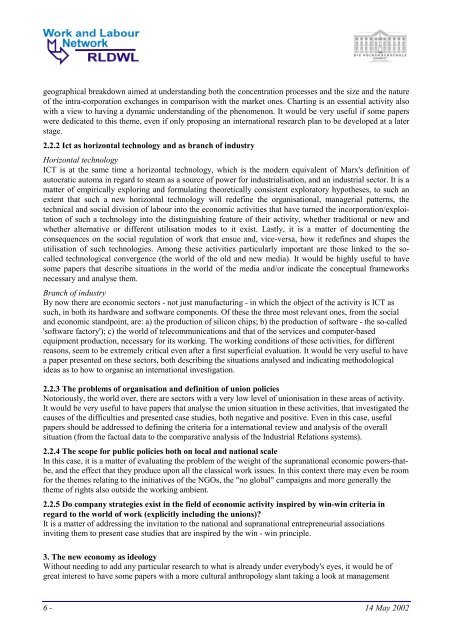"Labour, Globalisation and The New Economy" - rldwl
"Labour, Globalisation and The New Economy" - rldwl
"Labour, Globalisation and The New Economy" - rldwl
You also want an ePaper? Increase the reach of your titles
YUMPU automatically turns print PDFs into web optimized ePapers that Google loves.
geographical breakdown aimed at underst<strong>and</strong>ing both the concentration processes <strong>and</strong> the size <strong>and</strong> the nature<br />
of the intra-corporation exchanges in comparison with the market ones. Charting is an essential activity also<br />
with a view to having a dynamic underst<strong>and</strong>ing of the phenomenon. It would be very useful if some papers<br />
were dedicated to this theme, even if only proposing an international research plan to be developed at a later<br />
stage.<br />
2.2.2 Ict as horizontal technology <strong>and</strong> as branch of industry<br />
Horizontal technology<br />
ICT is at the same time a horizontal technology, which is the modern equivalent of Marx's definition of<br />
autocratic automa in regard to steam as a source of power for industrialisation, <strong>and</strong> an industrial sector. It is a<br />
matter of empirically exploring <strong>and</strong> formulating theoretically consistent exploratory hypotheses, to such an<br />
extent that such a new horizontal technology will redefine the organisational, managerial patterns, the<br />
technical <strong>and</strong> social division of labour into the economic activities that have turned the incorporation/exploitation<br />
of such a technology into the distinguishing feature of their activity, whether traditional or new <strong>and</strong><br />
whether alternative or different utilisation modes to it exist. Lastly, it is a matter of documenting the<br />
consequences on the social regulation of work that ensue <strong>and</strong>, vice-versa, how it redefines <strong>and</strong> shapes the<br />
utilisation of such technologies. Among these activities particularly important are those linked to the socalled<br />
technological convergence (the world of the old <strong>and</strong> new media). It would be highly useful to have<br />
some papers that describe situations in the world of the media <strong>and</strong>/or indicate the conceptual frameworks<br />
necessary <strong>and</strong> analyse them.<br />
Branch of industry<br />
By now there are economic sectors - not just manufacturing - in which the object of the activity is ICT as<br />
such, in both its hardware <strong>and</strong> software components. Of these the three most relevant ones, from the social<br />
<strong>and</strong> economic st<strong>and</strong>point, are: a) the production of silicon chips; b) the production of software - the so-called<br />
'software factory'); c) the world of telecommunications <strong>and</strong> that of the services <strong>and</strong> computer-based<br />
equipment production, necessary for its working. <strong>The</strong> working conditions of these activities, for different<br />
reasons, seem to be extremely critical even after a first superficial evaluation. It would be very useful to have<br />
a paper presented on these sectors, both describing the situations analysed <strong>and</strong> indicating methodological<br />
ideas as to how to organise an international investigation.<br />
2.2.3 <strong>The</strong> problems of organisation <strong>and</strong> definition of union policies<br />
Notoriously, the world over, there are sectors with a very low level of unionisation in these areas of activity.<br />
It would be very useful to have papers that analyse the union situation in these activities, that investigated the<br />
causes of the difficulties <strong>and</strong> presented case studies, both negative <strong>and</strong> positive. Even in this case, useful<br />
papers should be addressed to defining the criteria for a international review <strong>and</strong> analysis of the overall<br />
situation (from the factual data to the comparative analysis of the Industrial Relations systems).<br />
2.2.4 <strong>The</strong> scope for public policies both on local <strong>and</strong> national scale<br />
In this case, it is a matter of evaluating the problem of the weight of the supranational economic powers-thatbe,<br />
<strong>and</strong> the effect that they produce upon all the classical work issues. In this context there may even be room<br />
for the themes relating to the initiatives of the NGOs, the "no global" campaigns <strong>and</strong> more generally the<br />
theme of rights also outside the working ambient.<br />
2.2.5 Do company strategies exist in the field of economic activity inspired by win-win criteria in<br />
regard to the world of work (explicitly including the unions)?<br />
It is a matter of addressing the invitation to the national <strong>and</strong> supranational entrepreneurial associations<br />
inviting them to present case studies that are inspired by the win - win principle.<br />
3. <strong>The</strong> new economy as ideology<br />
Without needing to add any particular research to what is already under everybody's eyes, it would be of<br />
great interest to have some papers with a more cultural anthropology slant taking a look at management<br />
6 - 14 May 2002


